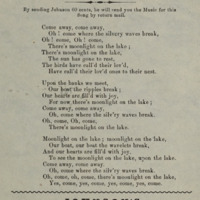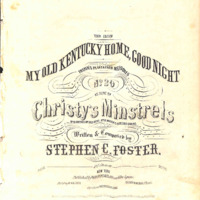Contents
Henry Russell
Henry Russell was an English composer and Baritone who greatly embellished many aspects of his own life. He wrote roughly 300 pieces, most of them vocal airs with piano accompaniment, although he boasted that he composed up to 800.[1] Russell began vocal and piano lessons at a young age. When he was about 18 years of age, he made a trip to Italy. While there he proclaimed that he studied at the Bologna Conservatory, worked with Rossini at the Teatro Carcano as a piccolo player, studied theory with Bellini, met Italian librettist Felice Romani, came in contact with opera singer and composer Michael William Balfe, and was appointed choir conductor at an opera house.[2] Five years later he published L’Amico dei Cantanti, his treatise on singing, where he again boasted of his musical adventures in Italy. His treatise offered the bare minimum information regarding singing and plagiarized exercises from Solfège ou Nouvelle Méthode de musique by Jean-Joseph Rodolphe.[3] The same year of his publication Russell travelled to North America. In America Russell flourished as a solo recitalist, molding the recital to fit his baritone voice through narrative stories and compositions.
In 1837 he was outed by the National Gazette in Philadelphia which denounced his exaggerated claims in Italy, noted his plagiarism of Jean-Joseph Rodolphe’s exercises, and accused him of stealing segments of other composers’ work and passing them off in his own compositions.[4] Musical World, a London publisher, produced an article in 1839 that listed the same offences as the National Gazette, but kept his name anonymous.[5] In addition to declaring him a fraud the Musical World accused Russell of scamming the American people out of their money. Surprisingly, the notification of these falsehoods had little to no effect on his career in the United States. As a composer and performer, he continued to succeed, mainly due to his lively performances that were modeled after the theatrical performances of Samuel Foote, Charles Dibdin, and Charles Mathews. Their solo performances included theatrical monologues, orations of satire and social grievances, and lively musical compositions, aspects that Russell combined into his performance.[6] While his vocal abilities received mixed reviews, his ability to captivate an audience through the pathos in his performance never wavered. Performances in his early career focused heavily on a dramatized narrative of cataclysmic events while performances in his later career had nostalgic remembrances of better times.
Recently another possible act of plagiarism may be Russell’s A Life on the Ocean Wave. The revival of Michael William Balfe’s Falstaff in 2008 brought speculation of Russel’s air and Balfe’s melody at the top of the second act.[7] While these two melodies were written at roughly the same time in two different countries it is believed that Balfe’s composition was written first and that copies of the score could have been acquired by Russell prior to the publication of A Life on the Ocean Wave.[8] However, due to laissez-faire copyright and limited documentation on both compositions it cannot be successfully proven. After the song’s publication, well known chartist activist Ernest Jones set A Life on the Ocean Wave to new text in 1856 to better align it to the chartist cause.[9] The new song entitled Hurrah for the Land we Love was a chartist anthem, pushing for reform of suffrage for working-class men in England. While Russell did not align himself with Chartism, believing it to be a “formidable nuisance,” he was forever linked to it through the parody of his song and by association with lyricists such as Eliza Cook and Charles Mackay.[10]
| A Life on the Ocean Wave | Hurrah for the Land We Love |
|---|---|
|
A life on the ocean wave! Chorus: Once more on the deck I stand Chorus The land is no longer in view Chorus |
Hurrah for the land we love! Chorus: A lesson the traitors teach, Chorus |
[1] John A. Stephens, William McClellan, and Andrew Lamb, “Russell, Henry,” ed. Dean Root, Accessed January 15, 2021, https://doi.org/10.1093/gmo/9781561592630.article.A2258090.
[2] Susan Rutherford, “Singer for a Million: Henry Russell, Popular Song, and the Solo Recital,” In London Voices, ed. Roger Parker and Susan Rutherford (Chicago: University of Chicago Press, 2019), chapter 10, doi: 10.7208/chicago/9780226670218.003.0011.
[3] Rutherford, “Singer for a Million,” Chapter 10
[4] Rutherford, “Singer for a Million,” Chapter 10
[5] Rutherford, “Singer for a Million,” Chapter 10
[6] Rutherford, “Singer for a Million,” Chapter 10
[7] Andrew Lamb, “Who Really Composed A Life on the Ocean Wave?,” British Music Society News, No. 124 (December, 209). 217.
[8] Lamb, “Who Really Composed,” 218
[9] Rutherford, “Singer for a Million,” Chapter 10
[10] Rutherford, “Singer for a Million,” Chapter 10

